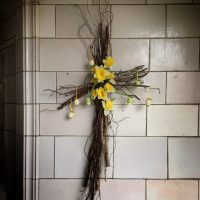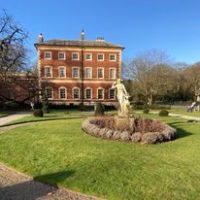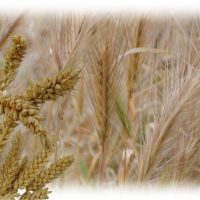Prayers of Approach
Lord, you have called us and equipped us to serve you; you have called us and equipped us to bear good fruit; you have called us and equipped us to share your blessings. We come to worship and bless your name.
God of all ages and all generations, we bring before you today: ourselves and all that has been entrusted to us, our prayers to surround those who are in trouble, our words to share your good news, our hands to reach out to those who are lonely, our feet to walk with those whose journey is hard, our hearts to pass on your great legacy of love, and our lives for you to shape and nurture. We lay all this before you, in Jesus’ name.
Holy God, Father, Son and Spirit, creator, sustainer, empowerer, we worship you. We give you thanks for all that is beautiful: for all that is fruitful, for all that is lifegiving, for all that is precious. And we thank you too for entrusting us with the privilege and the responsibility of passing on the baton of your creativity and your ministry of care for all you have made.
Amen.
Hymn Praise the Lord, ye heavens adore him (R&S 116)
Readings: Isaiah 5:1-7
Matthew 21:33-46
Introduction
The reading from Isaiah is a song about an unfruitful vineyard. The imagery moves from the abstract farmer to the real people of Jerusalem and Judah and the tone changes from a pretty song to a harsh detailing of what will be done to the vineyard that yields bad fruit. The vineyard belongs to none other than the Lord and the vineyard is Jerusalem and Judah. The people have let the Lord down badly and not behaved justly. Although the song ends sadly, it is a precursor to the time when Israel may sing a new song.
Jesus too tells a story about Israel and God using the familiar image of a vineyard and his version also leaves his listeners feeling uncomfortable. With their certainties challenged, the religious authorities are fearful for themselves.
Hymn I danced in the morning when the world was begun (R&S 195)
Sermon/Reflection
In all of today’s readings (including Psalm 80:7-15 and Philippians 3:4-14) we are challenged to see ourselves as we really are – that means, as God sees us – and not be fooled by who we think we are, or by our own desires. It is probably one of the hardest things for any of us to do. One area however in which I am pretty sure I know what I am (or rather what I am not) is that I am not a gardener! Some people are described as having ‘green fingers’ – being a good gardener. Some may have an allotment, growing all manner of produce. Some will be farmers of different types, whose whole lives revolve around agriculture. But I’m more like one of those people who shouldn’t be left in charge of a plant pot!
The manse garden is a bit of a wilderness – I always leave it too long before mowing the lawn and I quite like the dandelions and daisies that grow in it. There are also brambles encroaching from the neighbouring field and the rough patch over the fence (despite having bought some long handled pruners to chop them off as far away as possible), some of the fencing planks are leaning at odd angles and I have a small nettle patch (my excuse is that it is for the butterflies). In most cases I actually know what are weeds and what aren’t and what ought to be done, I just don’t want to do it. The line of thistles and other assorted weeds that line the drive round to the back of the house looked very pretty when they were all in flower, although I have to admit they now are a bit of a mess.
I suppose my attitude to gardening is a bit like the Israelites attitude to maintaining their relationship with God – just leave it alone, it’ll be alright in the end. But relationships, like gardening, have to be worked at. When I was young my dad had an allotment with a large greenhouse in which he grew several varieties of tomatoes and which had a grapevine stretching above them from one end of the greenhouse to the other. To bear fruit both the vine and the tomatoes had to be tended and I remember my dad going along ‘tickling’ all the flowers with a paintbrush to pollinate them.
In Psalm 80, Israel is described as a vine carefully transplanted from Egypt. Although it is possible to transplant a vine if it’s done with care Isaiah says this transplant has not gone well. Due to mismanagement, the vineyard goes wild and the grapes turn bad.
In Jesus’ parable, however, it’s the tenant farmers that turn bad, and the relationship between them and the owner spirals out of control. Matthew says that the Chief Priests and the Pharisees knew that this story was aimed at them, and this was the ‘final straw’ leading them to look for a way to arrest Jesus without the crowd turning on them. So, was this the story that got Jesus killed? Was this story of the killing of the landowner’s son told as a last chance, in effect a self-fulfilling prophecy? The religious leaders chose the path of violence rather than seeking reconciliation, resulting in yet more of the bloodshed – just what Isaiah had condemned his contemporaries for.
While the original context of both the Old Testament and Gospel stories was the particular relationship between God and the nation of Israel, there are also echoes of human beings in general consistently mismanaging what has been entrusted to them, or grasping for more – from Adam and Eve in the garden of Eden, through to our current stewardship of the world.
The landowner in Jesus’ parable offers the tenants one last chance. Sadly, they do not take it. Are there ways in which God is offering us, as individuals and as a people, another chance to do something different?
Hymn God, in his love for us, lent us this planet (R&S 85)
Prayers of Intercession
God of all creation, we thank you for calling us to be stewards of your earth and your treasures, for calling us to tend your Gospel, to share the fruits of your Spirit, to encourage your disciples in their daily lives, and to work together for the good of all – joyfully, humbly and urgently, in Jesus’ name.
God of one and God of all, we pray for: those who don’t know who they are, who can’t understand themselves or their place in society – God of all, we pray for them.
Those who don’t ‘fit in’, who are or seem to be different – God of all, we pray for them.
Those who don’t know where they come from, their heritage or home, their family or bloodline – God of all, we pray for them.
Those who feel lost and isolated, confused and afraid, rudderless or homeless, strangers in a strange land – God of all, we pray for them.
Those who wish they were someone else, or somewhere else, in some other time and place –
God of all, we pray for them.
In your great mercy, Lord, hear our prayers and grant surer journeys for them all. Amen.
Hymn Colours of day dawn into the mind (R&S 572)
Blessing
May we go in Jesus’ name, restored and renewed. May we know God’s face shining on us, and God’s Spirit flowing through us, So that our lives may be fertile ground for good news, and his blessing rest on us always.
Amen.
Prayers and other material (adapted) © Roots for Churches Ltd. Used by permission.







